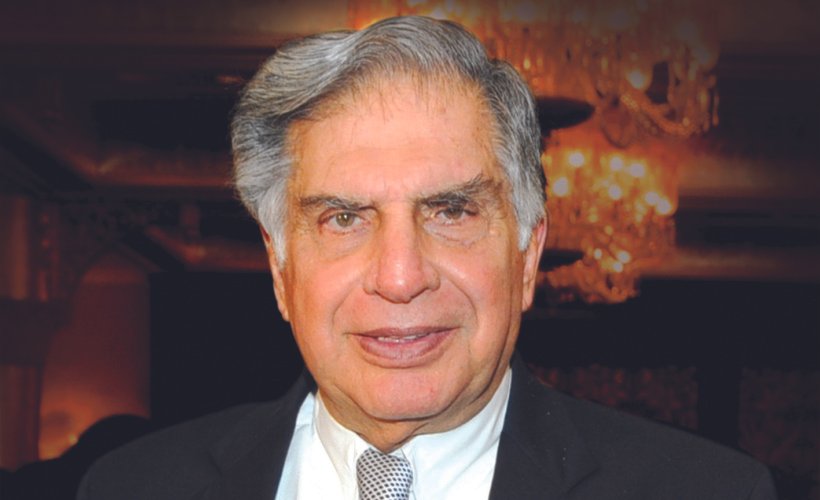
RATAN NAVAL TATA is deserving of admiration for numerous reasons, particularly for the way he navigated the challenges of leading the Tata Group. He did so with grace and a quiet dignity that is increasingly rare amid the tumult and complexity that often define the intersection of business and life in contemporary India
Ratan Naval Tata, born on December 28, 1937, in Mumbai, India, embodies a lineage of pioneering spirit and enterprise that has significantly shaped India’s industrial landscape. His family’s legacy, particularly that of his great-grandfather, Jamshedji Tata, who founded the Tata Group in 1868, established a foundation rooted in ethical business practices and a commitment to national progress. Jamshedji Tata, often hailed as the ‘Father of Indian Industry,’ envisioned not just a profitable enterprise but also a better society. His dream encompassed the establishment of key institutions such as Tata Steel and the Indian Institute of Science. Tata was the son of Naval and Soonoo Tata. Naval Tata was adopted by Ratanji Tata, son of Jamshedji Tata. Growing up in a prominent family, Tata was instilled with values that prioritised hard work, integrity, and social responsibility. His early education at the prestigious Cathedral and John Connon School and later at Cornell University, where he earned a degree in architecture, shaped his worldview. He further honed his business acumen at Harvard Business School, where he completed his MBA. In 1961 Tata met architect A. Quincy Jones who spent three weeks as an architecture design critic at Cornell. After completing Cornell, Tata briefly joined Jones at his firm Jones & Emmons in Los Angeles. While Tata was planning to settle in Los Angeles, he was called back to India by his grandmother.

Upon returning to India in 1962, he began his career at Tata Steel, working on the shop floor. This hands-on experience provided him with invaluable insights into the workings of the industry and the challenges faced by workers. In the 1970s, Tata was given a managerial position in the Tata Group. He achieved initial success by turning the subsidiary National Radio and Electronics (NELCO) around, only to see it collapse during an economic slowdown. In 1991, J.R.D. Tata stepped down as Chairman of Tata Sons, naming him his successor. Initially, Tata faced stiff resistance from the heads of various subsidiaries, who had a large amount of operational freedom under the senior Tata’s tenure. In response, Tata implemented a number of policies designed to consolidate power, including the implementation of a retirement age, having subsidiaries report directly to the group office, and requiring subsidiaries to contribute their profit to building the Tata group brand. Tata prioritised innovation and delegated many responsibilities to younger talent. Under his leadership, overlapping operations between subsidiaries were streamlined into company-wide operations, with the Group exiting unrelated businesses to take on globalisation.
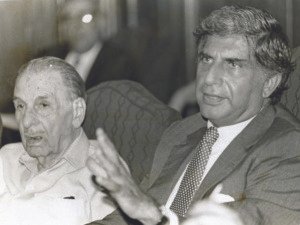
In 1991, Tata was appointed Chairman of Tata Group, succeeding his uncle, J.R.D. Tata. The economic landscape
of India was changing rapidly, with liberalisation ushering in new opportunities and challenges. Tata was not just inheriting a business empire; he was stepping into a pivotal role during a transformative period in Indian history.
Verticals under Ratan Tata
Under Tata’s stewardship, the Tata Group expanded into a diversified conglomerate that touched multiple facets of Indian life. His leadership philosophy emphasized innovation, ethical business practices, and a commitment to social welfare, setting the tone for the group’s expansion. During the 21 years that Tata led the Group, revenue grew over 40 times, and profit over 50 times. When he took over the company, sales overwhelmingly comprised commodity sales, but at the end of his tenure, the majority of sales came from brands. He had Tata Tea acquire Tetley, Tata Motors acquire Jaguar Land Rover, and Tata Steel acquire Corus. These acquisitions repositioned Tata from a largely India-centric group into a global business, with over 65% of revenues coming from international operations and sales.
Automotive Innovations
One of Tata’s most significant contributions was in the automotive sector, particularly with Tata Motors. Under his leadership, Tata Motors became a household name, symbolising both affordability and quality. He also conceptualised and spearheaded the development of the Tata Nano car after the grand success of Diesel Tata Indica, which helped put cars at a price-point within reach of the average Indian consumer. The launch of the Tata Nano in 2008 marked a watershed moment in the Indian automotive industry. Marketed as the world’s cheapest car, the Nano was designed to make car ownership accessible to India’s burgeoning middle class. Ratan Tata envisioned the Nano as a safe, reliable, and affordable alternative for families previously dependent on two-wheelers.
Despite its initial promise, the Nano faced several hurdles, including safety concerns and marketing challenges. However, it represented a bold attempt to democratise automobile ownership in India, reflecting Tata’s commitment to innovation. The venture showcased not only Tata’s willingness to take risks but also his deep understanding of the
Indian consumer’s needs. Beyond the Nano, Ratan Tata’s acquisition of Jaguar Land Rover in 2008 transformed Tata Motors into a global player in the luxury car segment. This strategic move brought iconic British brands into the Tata fold and highlighted Tata’s ability to leverage international markets while enhancing the quality and design of these vehicles. Under his guidance, Tata Motors received accolades for its sustainability initiatives and investments in electric vehicles, aligning with global trends towards greener alternatives.
Retail and Lifestyle
Tata recognised the changing dynamics of consumer behavior in India and spearheaded the Tata Group’s expansion into retail and lifestyle. Through Trent Ltd., the group launched Westside, a chain of retail stores that offered a unique shopping experience for customers seeking quality apparel and home products. Westside’s focus on affordability and stylish offerings quickly garnered a loyal customer base. In 1984 the Tata Group entered into a joint venture with the Tamil Nadu Industrial Development Corporation (TIDCO) and launched Titan Industries, thus making a foray in the watch market. In 1994, Titan diversified into jewellery with Tanishq and subsequently into eyewear with Titan Eyeplus. In 2005, it launched its youth fashion accessories brand Fastrack and the Titan Raga for women.
Moreover, Tata’s foray into the e-commerce space with Tata Cliq demonstrated his foresight in adapting to digital trends. By integrating online and offline shopping experiences, he positioned Tata Group as a competitive player in the retail landscape.
He had invested in Snapdeal – one of India’s leading e-commerce websites. In January 2016, he invested in Teabox, an online premium Indian Tea seller, and CashKaro.com, a discount coupons and cash-back website. He had made small investments in both early and late stage companies in India, such as INR 0.95 Cr in Ola Cabs. In April 2015, it was reported that Tata had acquired a stake in Chinese smartphone startup Xiaomi. In 2016, he invested in Nestaway an online real-estate portal that later acquired Zenify to start the online real-estate and pet-care portal, Dogspot. Tata also launched a companionship startup for senior citizens named Goodfellows, to encourage inter-generational friendships
This diversification not only reinforced the Group’s commitment to serving the evolving needs of Indian consumers but also created new avenues for growth.
Healthcare
Tata’s commitment to social causes is evident in the Tata Group’s significant investments in healthcare. The Tata Memorial Hospital in Mumbai, established in 1941, is renowned for its pioneering work in cancer treatment and research. Tata’s leadership emphasised the importance of accessible healthcare, particularly for marginalised communities. Under his guidance, the hospital expanded its facilities and research capabilities, ensuring that quality cancer care is available to those who need it most. In 2011, The Tata Memorial Center (TMC) was inaugurated in Kolkata, which is a state-of-the-art centre for cancer research, diagnosis and treatment. It is aimed specifically at helping cancer patients from the east and north-east of India and also from Bangladesh.
Philantrophy
In addition Tata Trusts, controls a significant portion of the Group’s wealth, are actively involved in various social initiatives. Tata has always believed in the philosophy that businesses should serve society. Tata Trusts engage in diverse fields, including education, rural development, and women empowerment. Initiatives like the Tata Water Mission aim to provide clean drinking water to underserved areas, exemplifying Tata’s commitment to social responsibility. Donations by the Tata Group and the related philanthropic collective called Tata Trusts have led to the establishment of a variety of institutions and scholarships in U.S. universities. These include a biological and physical sciences research facility at the University of California, San Diego, and an executive center at Harvard Business School − both are named Tata Hall. An endowment to Cornell University provides financial aid to students from India. A donation from Tata Consultancy Services to Carnegie Mellon University has funded the Tata Consultancy Services Hall, which houses the School of Computer Science Institute for Software Research and a few other facilities. The Tata Center for Technology and Design at the Massachusetts Institute of Technology works on providing solutions to challenges faced by communities that have limited access to electricity, low income, and poor literacy. In recognition of the Tata family’s ‘constructive philanthropy,’ the Carnegie family of organisations awarded the Tata family the Carnegie Medal of Philanthropy in 2007.
Tata’s philanthropic efforts have not only focused on healthcare and education but also on environmental sustainability. The Tata Group has initiated several programs aimed at promoting renewable energy and reducing the carbon footprint of its operations. This holistic approach to business reflects Ratan Tata’s belief that corporations have a duty to contribute positively to society and the environment.
Hospitality and More
Incorporated in 1899 by Jamsetji Tata, the Indian Hotels Company Limited (IHCL) opened its first hotel, The Taj Mahal Palace, Bombay (now Mumbai) in 1903. Dubbed as the best hotel East of Suez, this hotel transformed the face of Bombay and introduced authentic Indian hospitality to the world, while bringing global luxuries to the country.
The hospitality sector, particularly through Tata’s iconic Taj Hotels, has also flourished under Tata’s leadership. The Taj Mahal Palace Hotel known for its opulence and historical significance became a global symbol of resilience during the 2008 terrorist attacks. Tata’s decision to reopen the hotel shortly after the tragedy highlighted the Tata Group’s commitment to the city and its heritage.
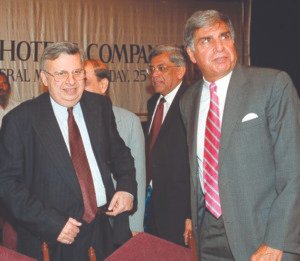
Under Tata, the Taj Hotels chain expanded both domestically and internationally, with properties in key global cities. The focus on exceptional service and hospitality set new benchmarks in the industry. Tata’s emphasis on sustainable tourism also led to initiatives that prioritise environmental stewardship while delivering luxurious experiences. IHCL and its subsidiaries bring together a group of brands and businesses that offer a fusion of warm Indian hospitality and world-class service. Besides Taj – the iconic brand for the most discerning travelers; the subsidiaries include SeleQtions, a named collection of hotels; Vivanta, sophisticated upscale hotels; and Ginger, which is revolutionising the lean luxe segment.
From opening the doors to India’s living grand palaces, to establishing the nation’s most-exclusive club, The Chambers, and from discovering and creating landmark tourism destinations like Goa and Kerala to hoisting the tricolour globally with iconic hotels in Europe and the USA, IHCL has always played a leadership role in the global hospitality landscape. In 2021, the Tata Group won the bid to take over Air India, an airline that was originally owned by the conglomerate and subsequently nationalised in 1953. It was an evocative moment for Tata, who had stepped down as interim chairman by then.
Trusts and Animal Welfare
A lesser-known aspect of Tata’s persona is his profound love for animals.
His legacy of compassion, particularly for stray dogs, is most evident at the headquarters of the Tata Group, Bombay House. In a testament to Tata’s empathy, a dedicated kennel was constructed on the ground floor of Bombay House in 2018 during a renovation. This kennel, spanning a spacious room, is equipped with amenities that many humans would envy. It features a bathing area tended by an attendant, a bunk bed for napping, and climate-controlled blinds to ensure the comfort of its canine residents.
In 2018, a poignant moment underscoring Tata’s love for animals emerged when he was scheduled to receive a prestigious lifetime achievement award for his philanthropic efforts from Prince Charles (now King Charles III) at Buckingham Palace. This event, hosted by the British Asian Trust, aimed to honor Tata’s long-standing commitment to charitable initiatives. However, at the last minute, Tata chose to cancel his trip to London due to the serious illness of his dog.
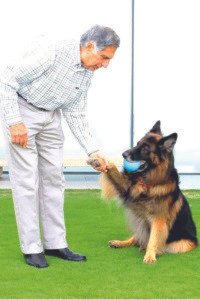
Upon learning of this decision, King Charles expressed his admiration, remarking, “That’s a man. That’s the man Ratan is. That’s why the House of Tata is what it is. That’s why it’s on a stable course.”
Among Tata’s many dogs, one stood out − Goa, a stray who became a close companion. Tata shared the story behind the dog’s name, explaining how Goa was a stray puppy who managed to climb into a colleague’s car in Goa and ended up at Bombay House, Tata’s headquarters.
He has often spoken about the responsibilities that come with wealth, advocating for the ethical treatment of animals and promoting initiatives that protect them. His work in this area is further supported by Shantanu Naidu, his trusted personal assistant and deputy general manager of Tata Trusts, who plays a vital role in the animal hospital’s operations.
Awards and Recognition
Tata’s illustrious career has earned him numerous accolades, recognizing his contributions to business, society, and philanthropy. He was awarded the Padma Bhushan in 2000 and the Padma Vibhushan in 2008, India’s second and third highest civilian honours, respectively. These awards reflect not only his business acumen but also his unwavering commitment to social causes.
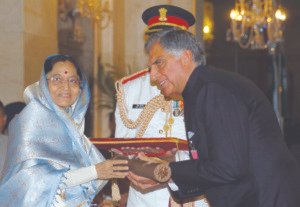
In addition to national recognition, Tata has received numerous international awards, including honorary doctorates from several prestigious institutions. His leadership style, characterized by humility, inclusivity, and foresight, has inspired countless entrepreneurs and leaders across the globe.
Ratan Tata’s journey is a compelling narrative of visionary leadership intertwined with profound social responsibility. From his early years, shaped by a rich legacy of innovation, to his pivotal role in transforming the Tata Group into a global powerhouse, his impact on India and the world is undeniable. His commitment to fostering innovation, philanthropy, and animal welfare showcases a leader who believes that businesses can and should be a force for good.
As Tata Group continues to evolve, his principles and vision will undoubtedly guide its future endeavours, leaving an indelible mark on the landscape of Indian industry and beyond. The enduring legacy of Tata serves as a beacon for future generations, inspiring them to embrace the values of integrity, compassion, and social responsibility.m
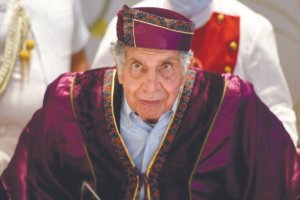
In his play Twelfth Night, William Shakespeare said, “Be not afraid of greatness: some are born great, some achieve greatness, and some have greatness thrust upon them.” Tata believed that true greatness lies not just in status but in the impact one has on others. He ensured his legacy would inspire future generations to pursue greatness. What Tata learned and passed on, and what his triumphs and his conduct revealed − that surely is his legacy.
In a rapidly changing world, Ratan Tata stands as a testament to the power of ethical leadership and the transformative impact of business when aligned with a higher purpose.
“HIS EYE RECEIVED EVERYTHING CLEARLY, AS HIS MIND PERCEIVED EVERYTHING CLEARLY: N CHANDRASEKARAN” 
“Anybody who met Mr. Tata came away with a story about his humanity, warmth, and dreams for India. There really was no one like him. Our relationship grew over the years, first focusing on business and eventually evolving into a more personal connection. We discussed interests ranging from cars to hotels, but when our conversations turned to other matters − those of daily life − he would show how much he noticed and felt. He was someone to be discovered, over time and through experience.
I remember several such instances.
Just after I became Chairman, I was introduced to a situation within Tata Motors which involved a dispute between the company and the employees’ union over wages for two years. In March 2017, Mr. Tata and I met the union leaders together. During the meeting, Mr. Tata relayed three messages: he regretted the delay in finding a resolution. He explained that the company was passing through hardship. And both of us committed that this dispute would be concluded within a fortnight.
Mr. Tata’s directions squarely focused on making sure the employees were well taken care of − not just to resolve the dispute, but to ensure them of their and their families’ well-being. Across other Group companies, his perspective on employees was uniform. It is something that has shaped a number of our leaders across the Group.
Around that same time, I expressed a desire to renovate our headquarters, Bombay House. Bombay House had not been touched since 1924, and more important (as many people told me) Mr. Tata would not like it. “Bombay House is a temple,” I was told, emphasising its sanctity. When I finally mentioned to Mr. Tata about Bombay House, he said, “May I ask you something? When you say ‘renovate’, do you mean ‘vacate’?”
I explained that we planned to move everyone to a nearby office.
He gently clarified: “Where will the dogs go?”
The dogs were an integral part of Bombay House, often seen at the reception.
“We will build a kennel.” “Really?” he said, considering it. When the renovation of Bombay House was complete, Mr. Tata wanted to see the kennel first. He was very happy to see how thoughtful the kennel’s design was, and how well the dogs would be cared for. Seeing his happiness with the kennel and his priorities was a reminder that while big projects are important, it’s the details that reveal how we think, what we prioritise, and how we are perceived. His joy was confirmation that we had done the right thing. If Mr. Tata ever visited a place, he could recall everything − from the placement of smallest piece of furniture, the lighting, colours, and so on. His memory was photographic. He remembered the covers and content of books and magazines and referred to them even years later. He was always observing and processing, from large ideas to minute detail.
There is so much else to say about who he was, but for now, as I process his absence, this will have to do: His eye received everything clearly, as his mind perceived everything clearly” N. Chandrasekaran, Chairman, Tata Sons





